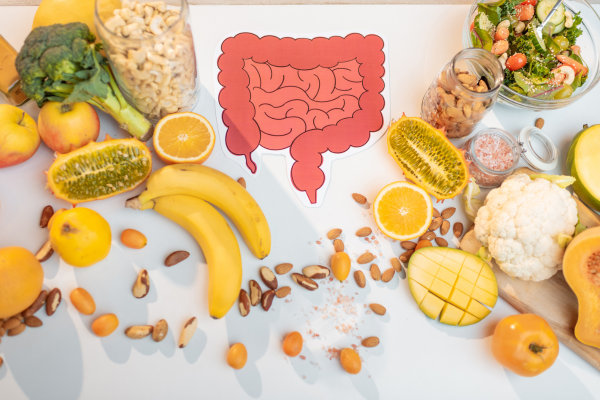The Connection Between Gut Health and Overall Well-Being
Your gut is home to trillions of microorganisms, often called the gut microbiome. This ecosystem works in harmony to digest food, absorb nutrients, and support various bodily functions. A disrupted microbiome, however, can lead to a cascade of health issues. Research highlights that maintaining gut health can enhance immune function, support mental well-being, and aid in managing body weight effectively.
By understanding its far-reaching effects, we can take proactive steps to nurture our gut health. Below are ten specific ways gut health influences the body.
10 Effects of Gut Health on the Rest of the Body
1. Digestive Health
The gut plays a key role in breaking down what we eat and ensuring the body absorbs vital nutrients. A properly functioning gut microbiome aids smooth digestion and can prevent uncomfortable symptoms like bloating, irregularity, or digestive upset. However, when this balance is disrupted, problems such as frequent acid build-up or long-term digestive conditions like irritable bowel syndrome may develop, interfering with overall health.
2. Emotional and Mental Harmony
The link between your gut and brain is a powerful connection. Sometimes referred to as the body’s “second brain,” the gut produces substances like serotonin that play a key role in regulating emotions. An unbalanced gut environment can amplify feelings of stress, low mood, or unease, whereas a healthy gut can contribute to emotional stability and better mental clarity.
3. Inflammation and Disease Prevention
Systemic inflammation is a common contributor to chronic illnesses like arthritis and diabetes. A properly functioning gut helps regulate the body’s immune responses, keeping inflammation in check. When gut health is compromised, it may intensify inflammatory conditions, exacerbating symptoms and complicating management.
4. Weight Control and Metabolism
Managing weight effectively often ties back to gut health. The composition of gut bacteria influences metabolic processes and hunger regulation. Some bacterial strains may promote weight gain or loss depending on dietary habits and lifestyle. Cultivating a diverse and balanced microbiome can enhance weight management efforts.
5. Immune System Support
Did you know that nearly 70% of your immune system resides in your gut? A robust gut microbiome acts as a protective barrier, shielding the body from harmful pathogens. When your gut health is compromised, you may notice increased susceptibility to infections or prolonged illnesses.
6. Energy Levels and Fatigue
Feeling tired all the time? Your gut might be to blame. Poor gut health can hinder nutrient absorption, depriving your body of the fuel it needs. A balanced gut, on the other hand, helps maintain consistent energy levels by optimizing digestion and reducing inflammation.
7. Skin Health
Your skin often reflects your internal health. Conditions like acne, eczema, or rosacea can be linked to poor gut health. A healthy gut microbiome reduces inflammation, supports detoxification, and enhances your skin’s natural glow.
8. Cardiovascular Health
Emerging research links gut health to heart health. Specific gut bacteria can influence cholesterol levels, blood pressure, and overall cardiovascular risk. By nurturing your gut, you indirectly support a healthier heart.
9. Sleep Quality
Your gut impacts your sleep cycle more than you may realize. Gut bacteria produce and regulate sleep-inducing hormones like melatonin. Poor gut health can disrupt these processes, leading to insomnia or restless nights.
10. Hormonal Balance
The gut is instrumental in maintaining hormonal equilibrium. It helps metabolize hormones like estrogen, preventing imbalances that could lead to conditions such as polycystic ovary syndrome (PCOS) or mood swings.
Steps to Improve Gut Health
Now that we know how gut health affects the body, what steps can you take to improve it? Here are some tips:
Eat a Diverse Diet: Include fruits, vegetables, whole grains, and fermented foods in your meals.
Stay Hydrated: Water aids in digestion and supports the gut lining.
Limit Processed Foods: Avoid artificial sweeteners, excessive sugar, and processed snacks.
Take Probiotics and Prebiotics:These supplements promote beneficial bacteria growth.
Exercise Regularly: Physical activity enhances gut function and reduces inflammation.
What Happens When Gut Health Is Neglected?
Ignoring the importance of gut health can open the door to various problems, ranging from minor digestive upsets to more serious, long-term health complications. A disrupted gut balance has been associated with conditions such as metabolic disorders, cognitive decline, and even some autoimmune diseases. When your gut is not functioning at its best, your body’s defenses may also weaken, leaving you prone to frequent illnesses and slower healing.
By prioritizing gut health, you set the foundation for better overall wellness. Even small adjustments, such as incorporating nutrient-rich foods and staying active, can have a significant, positive impact on your body and mind.
Final Thoughts: Nourish Your Gut, Nourish Your Life
Your gut is more than just an organ; it’s the control center for many aspects of your health. From energy levels to mental clarity, the gut’s influence is profound. Taking proactive steps to maintain gut health can lead to a happier, healthier life.
Frequently Asked Questions About Gut Health
Q1: What are some common indicators of poor gut health?
Symptoms such as frequent bloating, irregular bowel movements, persistent fatigue, skin irritations, and a weakened immune system can point to gut imbalances. Evaluating your dietary and lifestyle habits can help address these issues.
Q2: Is it possible to enhance gut health naturally?
Yes! You can make meaningful improvements by incorporating more fiber-rich foods, drinking enough water daily, and practicing stress management techniques like mindfulness or regular exercise.
Q3: Are probiotics essential for maintaining gut health?
Probiotics aren’t always necessary but can be beneficial in restoring gut balance, particularly after antibiotic use or digestive upset. They can support the growth of healthy gut bacteria.
Q4: How quickly can gut health improve?
Results vary from person to person, but noticeable changes may occur within a few weeks. Consistent dietary and lifestyle adjustments over several months lead to more sustained improvements.
Ready to transform your health?
Contact us today for personalized guidance on improving your gut health and overall wellness!



